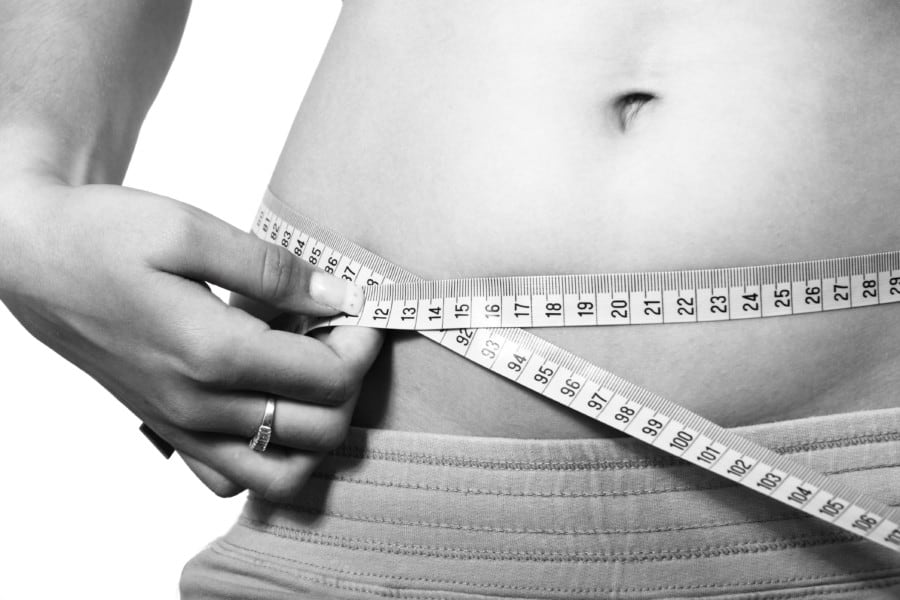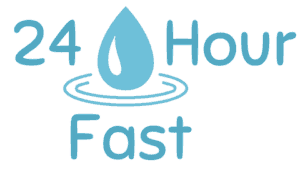Fasting and intermittent fasting specifically has been increasingly popular in the last few years. For good reasons, as if done in a right and consistent way, it can provide extremely interesting health benefits. One of them spiking a lot of interest
Fasting overview
So what is fasting? It simply corresponds to a certain period of time without any food. Intermittent fasting simply means alternating cycles of feeding periods and fasting periods. Generally speaking, you will be in a fasting state around 8 to 10 hours after your last meal or snack.
Now intermittent fasting encompasses a various array of fasting behaviors that can go from simple time-restricted eating every day for 8 to 16 hours to more prolonged fasts of 24 hours or more. There are lots of information on the different intermittent fasting methods, we will focus on the 24-hour fast impact on weight loss here.
Does a 24-hour fast promote weight loss?
Yes it definitely can.
A 24-hour fast can help you lose weight. However, it has to be done consistently and not just as a one time fast. Like any other method for weight loss, consistency and being able to fit it in your lifestyle on a regular basis is what’s most important.
Some research has been conducted on the subject and show that alternate day fasting show significant weight loss vs control group. In this second study, subjects lost 2.5% of their initial body weight within 22 days of alternate day fasting, while the fat loss mass represented 4% of their initial fat mass. Another finding is that their fasting insulin decreased significantly in comparison to the control group.

How much weight can I lose then?
Now you might be wondering: ‘ok, but how much weight loss should I expect’? Well, that’s a good question and while this will be obviously directly linked to your current BMR (metabolism at rest), activity level, hydration level as well as some various other factors, this research study can give us some overall understanding.
The rate of weight loss in that study was shown as 0.75 kg per week practicing alternate-day fasting. In that case, fasting days represented a 75% calorie restriction vs. regular feeding days.
The above is a conservative level of weight loss. If you decide to undertake a 24-hour fast every other day, that would be a form of alternate-day fasting, more restrictive than what the study tested. But 24-hour fasts can also be followed once or twice a week and not necessarily every other day. And while weight loss might be slower in that case, it can still help lose weight while still having more regular eating days in a week.
It is also worth noting that other forms of intermittent fasting can help with weight loss and while 24-hour fasts
How can fasting help you lose weight?
Calorie restriction
The core principle of a 24-hour fast whether you practice it once a week, twice a week or as alternate-day fasting, is that you will consume fewer calories over the course of a whole week. And that only is the main reason why it can promote weight loss.
That is, of course, assuming that you do not compensate during the eating days by over-eating. You are not fasting for a full day to just eat twice as much as usual the following days. This is the trap not to fall into.
In summary, this is a convenient way to reduce overall calorie intake in a week, without consciously trying to eat less all the time.
Hormones impact
While fasting, your body needs to be able to access stored energy more easily. To do so, your hormones will be impacted and regulated in a way to make the store energy more accessible. Here is what happens in your body while fasting (among other metabolism changes):
- Insulin: The level of insulin will drop significantly while fasting. After we eat, when the blood glucose level is high, the level of insulin goes up in order to decrease gradually that glucose level and store the energy in our cells. Once the energy has been stored, the blood glucose level goes down and so does the insulin level. During the fasting period, a lower level of insulin will help with the fat-burning process.
- Norepinephrine: This hormone is released by the nervous system and is extremely important in a lot of biological processes. One of them is to make the cells break down the stored body fat into free fatty acids that can be used as energy.
This study shows a higher level of hypothalamic norepinephrine content as a result of an intermittent fasting schedule. - HGH (Human Growth Hormone): fasting can enhance growth hormone secretion. Among others, growth hormone can help with fat loss and muscle gain.
During a 24-hour fast, using those different hormones processes, your body will burn the energy stored in the form of glucose and fat. It will first burn glucose reserve as it’s its preferred way of getting energy. Around 8 to 12 hours without food, the glucose reserve will run out and body fat will be tapped into as another source of energy.

24-hour fast compared to daily calorie restriction
We focused here mostly on a 24-hour fast and the different fasting schedules it can cover. However, while as explained above, it is an effective method for weight loss, is it the only one and more importantly is it better than others?
A popular way of losing weight is to reduce the number of calories you eat every day. This is the same idea as having a calorie deficit, but in this case, instead of looking at the whole week deficit, the focus is on having a smaller calorie deficit every single day.
It is based on the principle that if you eat fewer calories than your body requires to maintain its weight, you will lose weight. If you eat more, you will gain weight. It’s pretty simple. It’s also important to not consider food only for their calorie content but also their quality and nutritional value. We touch base on this a little bit further in this article.
So is alternate-day fasting or 24-hour fasts more efficient than daily calorie restriction? Well, some studies suggest that for weight loss purposes, they are both equally effective, with no significant difference between the two diets.
Testing and experimenting both is important so you can see what best suits you. It’s also important to keep in mind that fasting does have other benefits in addition to weight loss, that may not be as pronounced with a daily calorie restriction that doesn’t involve any longer fasting time.
Other 24-hour fast benefits
Indeed, there are several health benefits to prolonged fasts. Among others, here are some of the benefits you may expect:
- Blood sugar control and insulin resistance prevention
- Inflammation decrease
- Cells repair
- Heart health improvement
- Brain function protection
- Longevity increase by slowing down the aging process
That is why we recommend taking into account all the effects of a diet and not focusing on one aspect only, like weight loss, to make your decision. As we mentioned before, experimenting for yourself is also very important as every individual is different.
Potential downsides
If you are thinking of trying a 24-hour fast schedule, there are some potential downsides to be aware of:
- Low blood sugar: as mentioned earlier, fasting can help control blood sugar and most people won’t have any issue maintaining a stable blood sugar level during the 24 hours.
However, if you have any medical condition, it’s extremely important to check with your medical practitioner first before attempting any prolonged fast. - Nutrients intake: while having a calorie deficit, it’s important to make sure that you are providing sufficient nutrients, vitamins, and minerals to your body.
For example, eating junk food on your non-fasting days would deprive your body of the essential nutrients it needs. This behavior added to fasting days could become dangerous.
Focus on nutrient-dense foods on your non-fasting days, privileging fiber, protein, and fat. - Psychological impact: Fasting for a full 24 hours once or more in a week can be hard psychologically. Especially at the beginning, when it hasn’t become a habit yet. Mood swings can occur with a higher level of irritability. Those usually stop once you become used to your fasting routine. Nonetheless, be aware of your mindset. And if the negative impacts become too strong vs. the benefits, maybe another fasting routine would be worth the try.
Useful tips to fast for 24 hours
If you are to experiment it, here are a few tips that will hopefully be helpful during your fast:
- Make sure you drink enough water: a lot of water comes from the food we eat. On your fasting days, make sure you are well hydrated. Great teas or black coffee, without sweeteners, are also good options to add.
- Choose a busy day: when we are bored, one of the biggest tendency is to reach for food. Keeping your mind busy with several activities or commitments will help to shift your focus to something else than eating. Make sure your physical activity level is not too high though (don’t plan a marathon that day or a soccer game), especially if you are first experimenting, so you let your body adapt progressively.

- Self-control: during your fast as well as in the end, it’s crucial to master your mind. Your fasting days shouldn’t be an excuse to overindulge on food for the rest of the time. Keep your usual eating routine, it’s important to keep it working in the long term.
- Consistency: as in pretty much everything else in life, consistency is one major factor of success. Decide on a fasting routine, start progressively and try it on a long enough period to see if it works for you and your lifestyle. Don’t change eating routines every week, going from a 24-hour fast to a daily calorie restriction to switch to a low-carb diet before going back to a prolonged fast.
- Get reliable information, become knowledgeable, pick one routine that could work for you, stick to it, analyze the changes, see the results and then only make a decision to keep going or experiment something else.
- Don’t fast if you have any medical condition or health issue. It’s critical to check with your doctor first.
Focus on what you eat too
Focusing on fasting and the benefits it can bring is definitely important, but don’t forget the eating part too. Focusing on eating a healthy and balanced diet should be the first step, in my opinion, to optimize your health before looking into other beneficial behaviors like fasting.
Food is not just calories, not just energy. You can find a calorie in a bag of chips (and way more than one!), you can also find it in a broccoli. Do those 2 calories have the same value for your body? For your health? Of course not.

There is such a thing as empty calories. They won’t bring you any micro-nutrients, any vitamins. And most likely won’t be beneficial to you. Food is information for your body. Food is medicine. Please keep that in mind as it’s undervalued, still to this day.
That’s why I recommend focusing on your diet first if you haven’t optimized it yet. Depending on where you start, and there is no wrong starting point, shifting to a healthier diet might already help you not only lose some weight but also feel more energized throughout the day.
Then once your diet is better, and it doesn’t have to be perfect (does perfection even exist?), you can consider proceeding with a fast, that might help further with weight loss as well as all the other health benefits we mentioned above.
In summary
A 24-hour fast can definitely help with weight loss. But if you want a long-term benefit, this has to be incorporated in your lifestyle as a consistent practice. Some other intermittent fasting methods can also help, and experimenting to find the one that best suits you is best.
There are also significant other health benefits with fasting. But this is not a magic diet. Consistency and long term focus are important. If you are looking to lose weight IN 24 hours, this is not the place and in my opinion, shouldn’t be a goal for anyone as way too drastic and short-term focused.
The information we provide at 24hourfast.com is not intended to replace a consultation with a qualified medical professional. By interacting with this site, you agree to our disclaimer.
